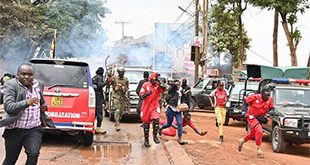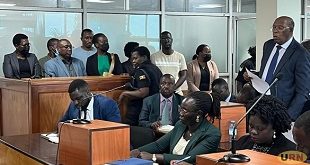
By the Independent Team
Bujumbura (Burundi) (AFP) – An attempt to overthrow Burundian President Pierre Nkurunziza ended in failure on Friday as coup leaders admitted defeat and were arrested or forced to go on the run from loyalist troops.
General Godefroid Niyombare, who launched the coup in the central African nation earlier in the week, told AFP by telephone that he wanted to give himself up while other top generals were arrested
The dramatic end to the coup attempt ended 48 hours of uncertainty over who was in charge of the small, landlocked and impoverished nation, which has been gripped by a political crisis over Nkurunziza’s controversial bid to stand for a third consecutive term in office.
“We have decided to surrender,” Niyombare said. “I hope they won’t kill us.”
A senior police official said Niyombare was still on the run, but that three other pro-coup generals had been detained. The loyalist police official said they were still alive so they could be put on trial.
The coup leaders’ spokesman, Zenon Ndabaneze, was speaking to AFP confirming that the putschists had decided to surrender when loyalist troops arrested him, deputy coup leader Cyrille Ndayirukiye and another senior figure among the mutineers.
“We decided to give ourselves up. We have laid down our arms. We have called the security ministry to tell them we no longer have any arms,” Ndabaneze said, seconds before he could be heard being arrested.
“There will be no foul play. We won’t kill them, we want to keep them so they can be judged,” the police official told AFP after the arrests.
The presidency meanwhile announced that Nkurunziza — who was abroad when the coup was declared — was back in the capital and poised to address the nation.
“He is in Bujumbura in a very secure place,” an aide to the president told AFP. “He will address the nation today.”
Nkurunziza was in neighbouring Tanzania for regional talks on Wednesday when the coup was launched, in a culmination of weeks of violent street protests over his bid to cling to power.
Opposition and rights groups insist that it is unconstitutional for Nkurunziza, who has been in office since 2005, to run for more than two terms. The president, however, argues his first term did not count as he was elected by parliament, not directly by the people.
Nkurunziza, a former rebel leader from the Hutu majority and born-again Christian, believes he ascended to the presidency with divine backing.
-Intense battle
More than 25 people have been killed and scores wounded since late April, when Burundi’s ruling CNDD-FDD party — which has been accused of intimidating the opposition and arming its own militia — nominated Nkurunziza to stand for re-election in June 26 polls.
It remains unclear, however, how many have died since the launch of the coup, and unrest could continue — with civil society activists calling for a resumption of demonstrations after the failure of the coup.
“Out of principle we are against coups, but we saw that the Burundian people were broadly welcoming of the coup attempt, which show that Burundi needs change,” anti-Nkurunziza activist Vital Nshimirimana told AFP.
The coup attempt had raised fears of a return to widespread violence in the impoverished country, which is still recovering from a 13-year civil war that ended in 2006 and left hundreds of thousands dead.
On Thursday, loyalist troops fought off two major attacks by rival soldiers in an intense battle for control over the strategically important state broadcaster.
The fight for RTNB, the state radio and television broadcaster, was seen as crucial to control the flow of information as Burundi’s main private radio stations and the largest independent television channel were no longer broadcasting.
Another coup leader, General Cyrille Ndayirukiye, said the rebels had been “faced with an overpowering military determination to support the system in power”.
The bodies of three soldiers were seen by an AFP journalist lying in the street near the scene of the clashes.
The coup announcement drew international criticism, with the United States insisting that Nkurunziza remained “the legitimate president” — even if it has also been firmly critical of his bid to stay in power.
The United Nations Security Council, in emergency talks on the crisis, called for an end to the violence and “the holding of credible elections” while separately, UN Secretary-General Ban Ki-moon condemned “attempts to oust elected governments by military force” and urged calm.
More than 50,000 Burundians have fled the violence to neighbouring nations in recent weeks, with the UN preparing for thousands more refugees.
In his message announcing the coup, Niyombare signalled he did not want to take power himself, vowing instead to work for “the resumption of the electoral process in a peaceful and fair environment”.
Niyombare is a highly respected figure who was sacked from his intelligence post in February after he opposed Nkurunziza’s attempt to prolong his 10-year rule.
Asked to decide on the issue of a third term, Burundi’s constitutional court found in the president’s favour, but not before one of the judges fled the country claiming its members were subject to death threats.
 The Independent Uganda: You get the Truth we Pay the Price
The Independent Uganda: You get the Truth we Pay the Price


